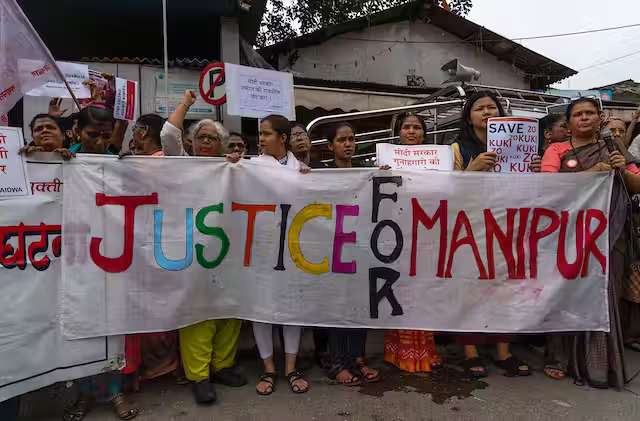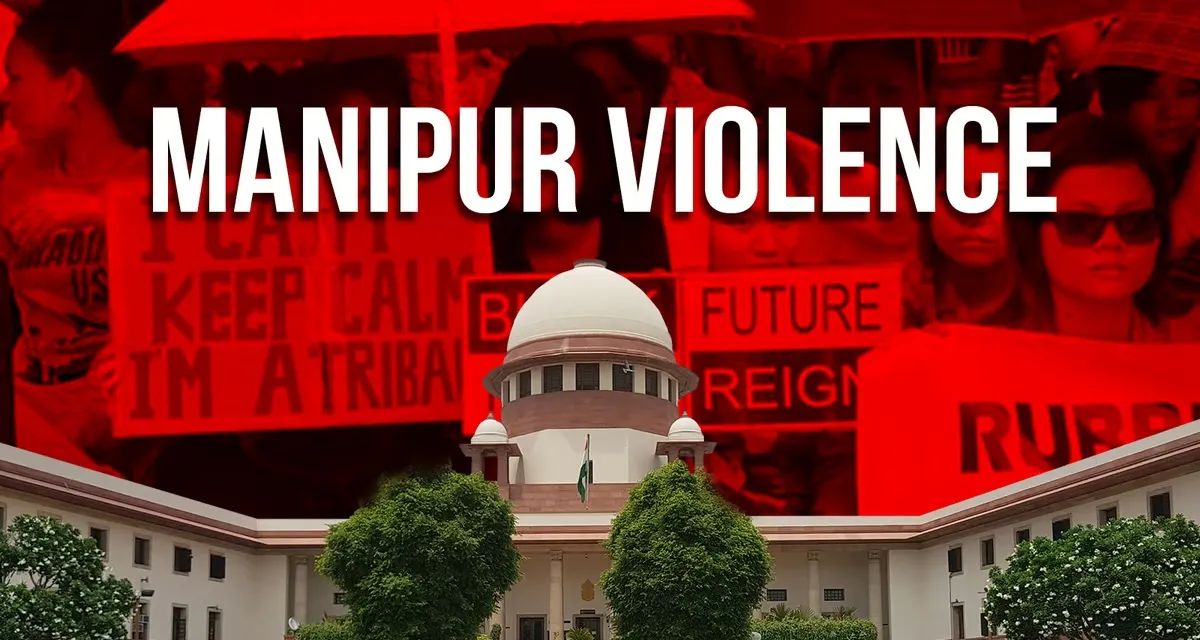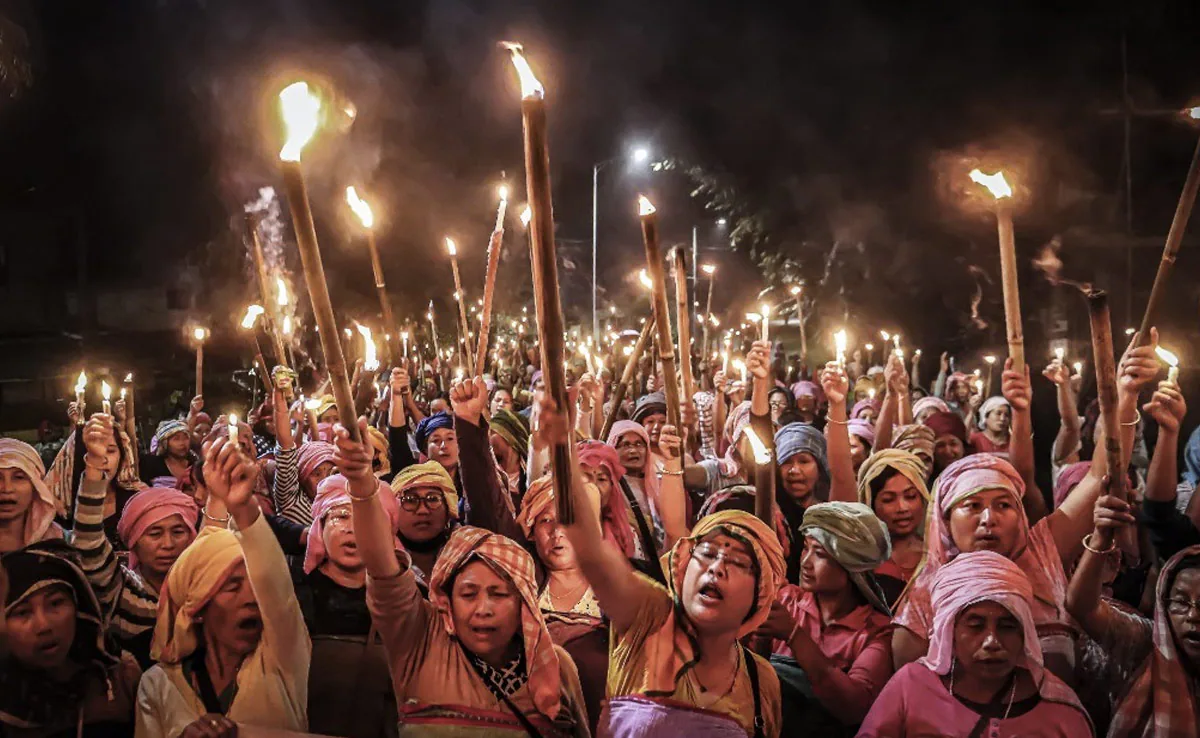Unraveling Manipur Violence: Supreme Court Panel Exposes Civil Society Interference
In the aftermath of the Manipur violence, the Supreme Court-appointed committee sheds light on disturbing revelations. The committee, led by former Chief Justice Gita Mittal, asserts that certain civil society groups are not only pressuring locals but also fueling ethnic tensions. In its 13th report, the committee underscores the coercion faced by the next of kin, preventing them from accepting the mortal remains of their loved ones.
Unveiling Covert Agendas: A Closer Look
The committee’s report accuses elements within Manipur of intentionally maintaining chaos and withholding accurate information from the Supreme Court. It expresses concerns about vested interests aiming to sustain tensions between communities, hindering the restoration of peace and harmony in the state.
Supreme Court’s Call for Dignified Burial
In response to the unsettling findings, the Supreme Court has directed the Manipur government to ensure a respectful burial for unidentified and unclaimed bodies resulting from the violence.
Civil Societies’ Opposition: Unveiling Motives
Contrary to the humane act of performing last rites, civil societies in Manipur, as highlighted by the committee, oppose these rituals due to alleged “vested interests.” The report suggests that these groups seek to derive mileage and compel authorities to meet their unwarranted demands.
Disturbing Displays and Unsettling Protests
The committee expresses deep concern over the methods of protest observed in riot-hit Manipur. Civil society organizations, as a form of protest, placed 50 coffins outside the Deputy Commissioner’s office in Churachandpur, creating constant anguish for the bereaved.
Legal Framework: Navigating Last Rites
The report delves into the legal aspects governing last rites in such cases, citing Section 160 of the Manipur Municipalities Act, 1994. This empowers local civic bodies to carry out burials or burning of unclaimed bodies, ensuring it is done free of charge within municipal limits.
Upholding Dignity Amid Strain on Resources
Referring to Sections 160 and 161 of the Act, the committee argues that failing to perform last rites in a dignified manner disrespects the deceased. Moreover, it highlights the immense strain on state resources caused by preserving mortal remains without proper burial.
Ex Gratia Conundrum: Civil Society Influence
The 14th report reveals the State government’s decision to offer an ex gratia compensation of ₹10 lakh to the next of kin. However, certain families, under the influence of Indigenous Tribal Leaders Forum (ITLF), Joint Philanthropic Organisations (JPO), Kuki Inpi Manipur (KIM), and other civil society groups, express reluctance to accept the compensation.
Committee’s Recommendations and Supreme Court’s Directive
The committee recommends that the Supreme Court direct the reluctant families to accept the ex gratia, urging the prohibition of civil society organizations from interference. In response, the Supreme Court issues directives, ensuring that all identified bodies can undergo last rites without interference.
In these challenging times, Senior Advocate Vibha Datta Makhija, along with Advocate-on-Record Baani Khanna, represents the committee, while Pukhrambam Ramesh Kumar, Standing Counsel, represents the State of Manipur. The legal proceedings aim to bring a semblance of order and dignity to the tumultuous aftermath of the Manipur violence.
Supreme Court’s Endeavor for Manipur’s Peace
As the legal saga unfolds in the aftermath of the Manipur violence, the Supreme Court’s unwavering commitment to restoring order becomes evident. The committee’s revelations expose a web of challenges, from civil society interference to legal intricacies surrounding last rites.
Civil Society’s Grip: Unraveling the Threads
The committee’s findings shed light on the pressure exerted by civil society groups, painting a picture of coercion and interference in the most intimate moments of grief. The manipulation to dissuade families from accepting the mortal remains of their loved ones raises questions about the motives behind such actions.
Orchestrating Chaos: A Disturbing Reality
The committee’s 13th report unveils a disturbing reality: certain elements within Manipur aim to perpetuate chaos. The intentional withholding of accurate information from the Supreme Court raises concerns about the true state of affairs in the violence-hit region.
Supreme Court’s Decree: Dignity in Burial
In response to the tumultuous situation, the Supreme Court issues a decree, urging the Manipur government to ensure a dignified burial for unidentified bodies. This directive reflects the Court’s commitment to upholding human dignity even in the face of adversity.
Opposition to Last Rites: Unmasking Motivations
The report exposes civil societies’ opposition to last rites, attributing it to alleged “vested interests” and a desire to “derive mileage.” The committee argues that such opposition not only hampers the grieving process but also impedes the restoration of normalcy in Manipur.
Legal Framework: A Guiding Light Amidst Turmoil
Delving into the legal intricacies, the report references Section 160 of the Manipur Municipalities Act, 1994. This section empowers local civic bodies to conduct burials or cremations of unclaimed bodies, emphasizing the importance of doing so without imposing charges.
Balancing Respect and Resources
Sections 160 and 161 guide the committee’s argument that the failure to perform dignified last rites places undue strain on the state’s already stretched resources. Upholding the deceased’s religious tenets becomes a crucial aspect, ensuring a harmonious balance between tradition and practicality.
Ex Gratia Dilemma: A Tussle for Compensation
The 14th report highlights a conundrum surrounding ex gratia compensation. While the State government aims to provide financial support to the bereaved, civil society influences create reluctance among certain families. The committee’s recommendation to the Supreme Court seeks to break this deadlock and ensure fair compensation distribution.
Supreme Court’s Mandate: A Step Towards Resolution
In response to the committee’s recommendations, the Supreme Court issues a series of directives. All identified bodies are granted the right to undergo last rites without interference. The court’s intervention aims to bring a semblance of order to the chaos, providing solace to the grieving families.
As the legal proceedings unfold, Senior Advocate Vibha Datta Makhija and Advocate-on-Record Baani Khanna stand as pillars of legal representation for the committee. Pukhrambam Ramesh Kumar, Standing Counsel, represents the State of Manipur, embodying the state’s commitment to navigating these complex legal waters and fostering a path toward peace.





